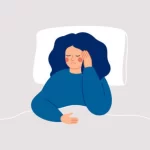If you’re planning a trip to a high-altitude destination, getting a good night’s sleep might be on your mind.
High altitudes can present challenges to sleep due to decreased oxygen levels, lower air pressure, dry air, and other environmental factors. But several tips can help you sleep better at high altitudes.
Gradual acclimatization is crucial to help your body adapt to reduced oxygen levels. Staying hydrated is another vital factor when sleeping at high altitudes.
Using a humidifier in your sleeping area can help add moisture to the air and prevent dryness, making breathing and rest easier.
It’s also important to create a comfortable sleeping environment. For instance, ensuring you have appropriate bedding materials, wearing warm clothes, and using earplugs and eye masks can help you sleep soundly.
Medication can also be used to enhance sleep duration and timing. Using insect repellent to avoid pests can prevent any potential sleep disruptions.
Read on to learn more about optimizing your sleep and waking up refreshed and rejuvenated during your high-altitude adventures.
How to Sleep Better at High Altitude: Essential Tips to Follow
High-altitude slumber may be difficult due to thin air and a lack of oxygen, but there are ways to make it easier. Here’s our go-to guide for getting those much-needed sleep at high altitudes:
1. Gradual Acclimatization
When traveling to high-altitude destinations, one of the best ways to improve your sleep is to give your body enough time to adjust gradually.
Rapid ascents can be dangerous and increase the likelihood of altitude sickness, which includes sleep-related symptoms. Spend a day or two acclimating at a lower altitude before ascending further to reduce the risk of experiencing sleep problems.
2. Stay Hydrated
Hydration is key when it comes to sleeping better at high altitudes. Due to the lack of humidity at higher elevations, dehydration can occur quickly, leading to symptoms such as dry throat and nasal passages.
Drinking plenty of water throughout the day can help combat dehydration and improve sleep quality. Also, limit your caffeine and alcohol intake, as both of these can cause dehydration and disrupt sleep.
3. Use a Humidifier
Since high-altitude environments are usually dry, it’s common to experience dryness in the throat and nasal passages, making it challenging to breathe and sleep.
A humidifier can moisten the air and help alleviate these symptoms. This simple addition to your sleeping environment can significantly improve sleep quality at high altitudes.
4. Consider Medication
If you’re struggling to sleep at a high altitude, you may consider talking to a healthcare professional about medication options.
Some medications can help alleviate symptoms of altitude sickness, including sleep-related issues.
It’s important only to take medication under the guidance of a healthcare professional, as some medications can have side effects or interact with other medications.
5. Keep Your Sleeping Environment Comfortable
Creating a comfortable sleeping environment is crucial to getting a good night’s sleep at a high altitude. Ensure that your bedding is comfortable and the room is dark, quiet and at optimal temperature for sleeping.
Consider using earplugs, an eye mask, and warm blankets to optimize your sleeping experience. These simple interventions can significantly improve your sleep quality and help you wake up feeling refreshed and energized.
6. Practice Relaxation Techniques
Relaxation techniques are essential for promoting better sleep at high altitudes. These techniques can include deep breathing, mindfulness meditation, gentle yoga, or progressive muscle relaxation.
Each of these techniques has been shown to reduce stress, calm the mind, and prepare the body for sleep.
Also, relaxation techniques can help alleviate altitude-related anxiety and stress symptoms, which can negatively impact sleep quality. Incorporating these techniques into your pre-sleep routine can promote deeper, more restful sleep.
7. Avoid Overeating and Heavy Meals Before Bedtime
Eating heavy meals close to bedtime can lead to discomfort, indigestion, and disrupted sleep. Digestion requires energy, and your body will work hard enough to adjust to the altitude.
To reduce the risk of sleep disruptions, try to eat smaller, lighter meals at least two to three hours before bedtime. This allows for proper digestion and ensures that your body has the energy it needs for restful sleep.
8. Manage Altitude Sickness Symptoms
Altitude sickness is a common issue among travelers at high altitudes. Symptoms such as headaches, nausea, dizziness, and difficulty breathing can disrupt sleep. Managing altitude sickness is crucial for a restful night’s sleep.
To effectively manage altitude sickness, it is recommended that you rest and hydrate well before sleep. Over-the-counter medications recommended by a doctor can help alleviate altitude sickness symptoms.
9. Consider Using a Nasal Decongestant
The dry air and changes in atmospheric pressure at high altitudes can sometimes cause nasal congestion. This can make it difficult to breathe while sleeping and disturb your sleep.
To alleviate nasal congestion, use a nasal decongestant spray or saline nasal drops before bedtime. These effectively ease nasal congestion and enable you to breathe more comfortably while sleeping, resulting in better sleep quality.
10. Use Insect Repellent
High-altitude areas are home to various insects, including mosquitoes, flies, and other biting bugs. These insects can disturb your sleep with their incessant buzzing, biting, and itching.
To avoid insect bites and reduce the risk of transmitting diseases, use insect repellent. This will keep insects at bay and allow you to sleep soundly without being disturbed by their unwelcome presence.
Opt for natural insect repellents when possible to avoid harsh chemicals that could harm your health in the long run.
Conquer Sleep at High Altitudes: Prepare and Care for a Restful Experience
Sleeping at a high altitude presents unique challenges. But with a little preparation and self-care, you can rest assured that you’ll get the rest you need to enjoy your adventure.
For a truly unforgettable high-altitude sleeping experience, take the time to get used to your new environment and stay hydrated.
Create a restful sleep space so that you wake up feeling energized for exploring. And don’t forget, if symptoms of altitude sickness strike, be sure to manage them promptly. Embrace these suggestions and make those lofty heights even more rewarding.





